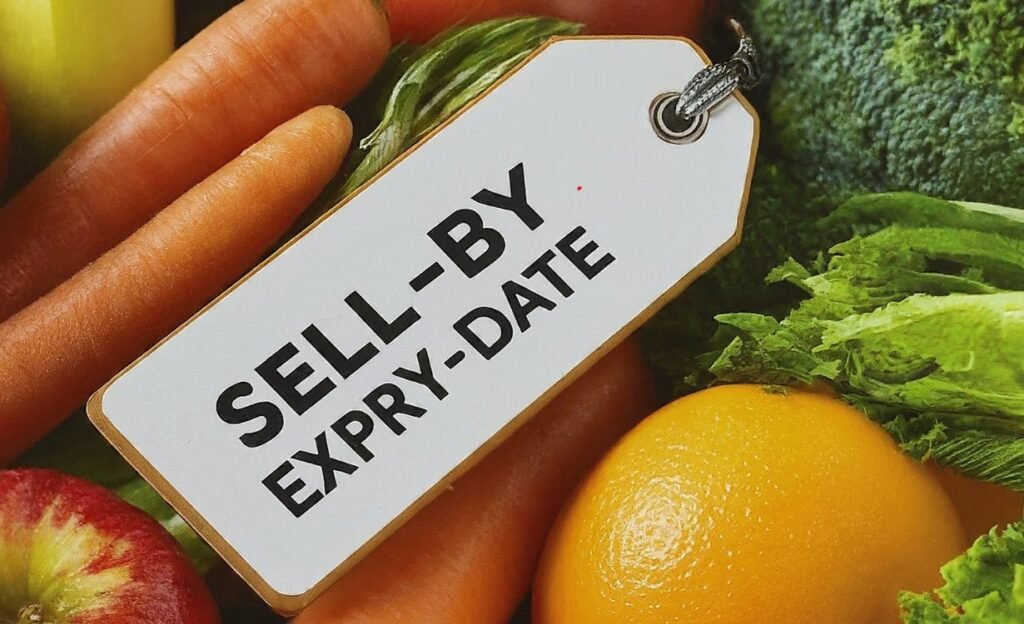Are you confused by the difference between sell by date and expiry date ?
You’re not alone!
Many of us get tripped up by these food labels, wondering if they’re a safety warning or just a suggestion.
But fear not, fellow foodies! This post will crack the code on “sell-by vs. expiry date”
so you can make informed choices about your groceries and avoid tossing out perfectly good food.
By the end of this post, you’ll be a sell-by and expiry date master!
We’ll break down the key differences between “sell-by” and “expiry” dates, so you’ll know exactly what they mean.
You’ll also learn when to trust these labels and how to use your senses to become a spoilage-spotting superhero.
Plus, we’ll share some handy food safety tips to keep your meals safe and scrumptious.
Understanding Food Dates: Sell-By vs Expiry (Use-By)
Food labels can be confusing, especially those pesky “sell-by” and “expiry” (sometimes called “use-by”) dates.
1. Sell-By Date
We won’t delve too deep here (check out our previous post for a sell-by date deep dive!)
but as a quick reminder, the “sell-by” date is more of a suggestion for stores.
It tells them how long to keep the product on the shelf for optimal quality.
So, a yogurt past its sell-by date might not be at its peak freshness, but it’s likely still safe to consume.
2. Expiry (Use-By) Date: The Safety Zone

This one’s a bit more serious.
It indicates the last date recommended for using the food to ensure its safety.
Think of it as a quality and safety checkpoint.
Manufacturers consider factors like bacterial growth and the potential for the food to degrade and form harmful byproducts when determining the expiry date.
After this date, the risk of foodborne illness increases.
Here are some examples:
Meat, poultry, and seafood: These products are particularly susceptible to spoilage and harboring harmful bacteria.
The expiry date on these items is crucial for safety.
As these proteins break down past their expiry, bacteria can multiply rapidly and even produce toxins that can make you sick.
Pre-packaged salads: Expiry dates on pre-cut, pre-washed veggies are important because they’ve been exposed to more air and handling, increasing the risk of contamination.
After the expiry date, these delicate greens can become breeding grounds for bacteria and start to wilt and release enzymes that can cause spoilage.
Infant formula: This is the only food where the expiry date is a strict safety guideline. Expired formula can harbor dangerous bacteria that can harm infants.
Important Note: Even with expiry dates, remember that proper storage plays a huge role in food safety.
The Regulation Roundup: Sell-By vs. Expiry Dates
Understanding the legal landscape behind these dates can further solidify their meaning.
Here’s the breakdown:
Sell-By Date:
Not a federal regulation: Unlike expiry dates, “sell-by” dates are not mandated by the U.S. Food and Drug Administration (FDA).
This means manufacturers have more leeway in setting them.
Store Management Tool: Primarily, sell-by dates serve as a guide for stores to manage their inventory and ensure products are sold at peak freshness.
For example, a grocery store might pull yogurt from the shelves a few days before its sell-by date to maintain customer satisfaction.
This was covered also in the previous post which discusses in deep the meaning of sell-by date here.
Expiry (Use-By) Date:
Safety Focus: Expiry dates, sometimes referred to as “use-by” dates, are more heavily regulated.
The FDA recommends manufacturers use these labels for perishable foods where there’s a greater risk of foodborne illness after a certain point.
Science-Based: Manufacturers determine expiry dates through scientific testing to estimate how long a food product remains safe for consumption under proper storage conditions.
These tests consider factors like bacterial growth and potential for spoilage.
State Variations:
It’s important to note that some states might have additional regulations for specific products, like dairy items, with their own “sell-by” date requirements.
However, these are exceptions, and generally, expiry dates hold more legal weight regarding food safety.
The Takeaway:
While both dates offer valuable information, they serve different purposes.
Expiry dates are a crucial safety measure, whereas sell-by dates are more about maintaining optimal quality for the consumer.
Remember, following both sets of guidelines, along with proper food handling practices, is key to keeping your food safe and delicious!
Beyond the Dates: Food Safety Tips You Already Know

By now, you’re well on your way to becoming a sell-by and expiry date whiz!
But remember, these dates are just one piece of the food safety puzzle.
Here’s a quick refresher on some essential practices we’ve covered in previous posts to ensure your meals are always safe and enjoyable:
Storage Savvy: Different foods have different storage needs.
Proper storage is crucial to slow down bacterial growth and maintain quality.
what is TDZ in food safety and how can we avoid itRemember, keep it cool! In our previous posts, we’ve delved deeper into refrigerator, freezer, and pantry storage best practices – so be sure to check those out for a more detailed breakdown.
The Danger Zone: This isn’t a spy movie, but it is important! The “Danger Zone” refers to temperatures between 40°F (4°C) and 140°F (60°C) where bacteria multiply rapidly.
Keep both hot and cold foods out of this zone for too long to minimize the risk of foodborne illness.
Sight, Smell, and Texture: Don’t just rely on dates! Use your senses to assess food spoilage.
Discoloration, off-odors, and slimy textures can all be signs that a food has gone bad. When in doubt, throw it out!
To know more about the best ways to prevent poor food safety you can read this post.
Conclusion
So, there you have it! the difference between sell-by date and expiry date is clear now.
Remember, while these dates provide valuable information, they’re not the sole determinants of food safety.
By understanding the difference between the two, practicing proper food handling, and trusting your senses, you’re well-equipped to make informed decisions about your groceries.
Let’s recap: “Sell-by” dates are more about freshness and store inventory, while “expiry” dates are about safety.
Always prioritize proper storage, cooking, and handling to ensure your food is safe to consume.
With a little knowledge and a dash of common sense, you can confidently navigate the world of food labels and reduce food waste while keeping your family safe.



